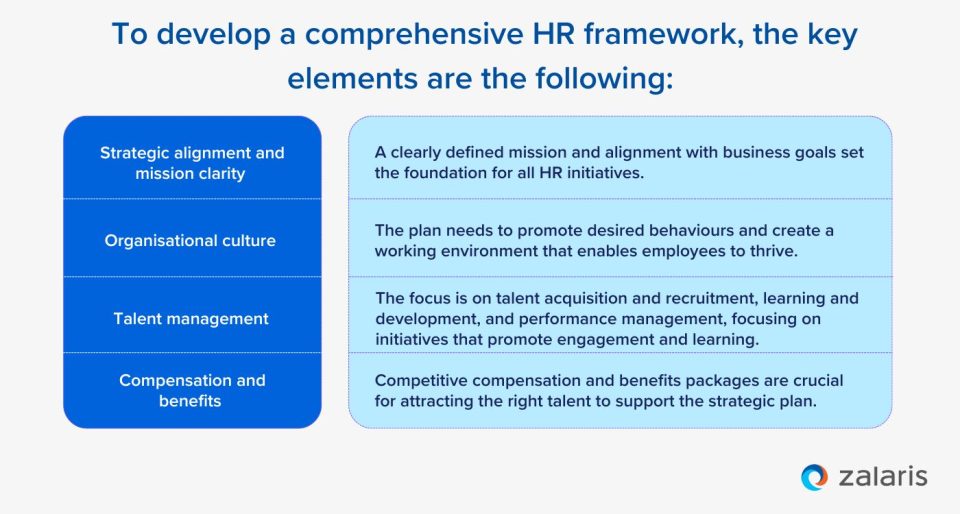To unlock true potential, HR must evolve into a proactive business partner—leveraging data, technology, and expert consulting to achieve measurable outcomes.
By adopting a consulting-inspired approach to strategic HR, organisations can align people practices with business goals, improve decision-making through data, and build more agile, employee-centric operations. This article explores the essential components of an effective HR strategic plan, provides actionable HR strategy examples, and highlights the role of HR management consulting in driving long-term success.
What is an HR strategy?
HR strategy is a comprehensive approach that aligns the organisation’s human resources practices with its overall business objectives. An effective strategy, therefore, goes beyond traditional personnel management to encompass strategic talent management, driving organisational success.
Modern HR strategies take a more proactive approach, using cross-functional collaboration between HR, finance, and operations to anticipate market disruptions. There is a greater emphasis on people analytics to predict future outcomes rather than merely analysing past trends. Overall, the focus of an HR strategic plan has shifted from recruitment to retention.
Key elements of a successful HR strategy
To develop a comprehensive HR framework, the key elements are the following:
These key pillars can be further narrowed into three core areas:
1. Workforce planning: Assessing current skills and capabilities while forecasting future talent needs based on business goals and market conditions.
2. Employee engagement, wellbeing, and diversity: Fostering a positive, engaging, and healthy work environment. Using employee wellness and work-life balance initiatives together with diverse and inclusive hiring practices.
3. HR policies, procedures, and data evaluation: Defining policies that ensure consistency, fairness and compliance, and establishing HR metrics aligned with business objectives.
How to implement an HR strategic plan & best practices for success
Successfully implementing an HR strategic plan requires structured execution, stakeholder engagement, and measurable outcomes.
1. Define the HR vision and its objectives
The overall HR strategy must align with business goals. To achieve this, HR teams need to set measurable and realistic objectives that are directly linked to business outcomes, such as the desire to meet diversity targets.
A well-defined vision can help gain executive and stakeholder buy-in. At this stage, senior leaders should be engaged by clearly articulating how the chosen HR strategy supports business priorities.
2. Conduct a gap analysis and develop the action plan
Current HR processes can be evaluated together with consultants. Talent capabilities, workforce engagement and organisational culture must be mapped out to identify specific areas for improvement.
Clearly specified roles, responsibilities, and deadlines can improve accountability at this stage. Allocate resources and define checkpoints to support progress tracking and timely adjustments.
3. Prioritise initiatives and communicate consistently
Focus initially on high-impact, manageable tasks that demonstrate early success. HR initiatives benefit from phased rollouts that manage resources effectively and enable early wins.
Communication should be transparent and consistent throughout the implementation of the HR strategy. Organisations can achieve this by regularly updating all employees on objectives, benefits, and progress.
4. Monitor, measure and evaluate progress
Track success against predefined metrics, such as employee engagement scores, retention rates, internal promotions, or cost-per-hire. HR teams need to regularly evaluate and measure these outcomes. If the framework is not working, strategies can be adapted based on data-driven insights.
5. Refine the HR strategy
Strategic HR management is not a one-time initiative. Businesses need a flexible mindset to modify initiatives based on feedback. Organisational goals can change, and external factors, recently revealed by the pandemic, can impact desired objectives. Revisit the HR strategy regularly to ensure alignment with changing business conditions, employee expectations, and market trends.
HR management consulting: How it drives HR success
Human resource management consulting can provide the right expertise, external perspectives, and advanced technology solutions, driving HR strategy plan’s success through:
Unbiased expertise: Consultants can identify gaps and inefficiencies that internal teams may miss.
HR process optimisation: They streamline operations, including payroll, recruitment, and workforce planning.
Technology integration: HR consultants introduce advanced technology solutions to improve data accuracy and help with best practices, including better employee experience.
Strategic alignment: They ensure HR goals closely align with business objectives, making HR a strategic partner rather than just administrative support.
Studies have found that organisations supported by HR consulting during HR technology implementations reported up to 20% improvement in overall workforce efficiency. Their HR administrative burdens are reduced by up to 30%.
Read more on the topic
HR strategy example: Consulting-inspired approach
A consulting-inspired approach transforms traditional HR strategies into dynamic frameworks that address business performance and evolving workplace challenges. A real-world example of strategic HR management consulting comes from our collaboration with Amica Group, a leading manufacturer of household appliances operating across multiple European markets.
HR strategy in action: Consulting with Amica Group
Amica was seeking to modernise its HR processes and better align them with business growth objectives. We supported them by consulting on SAP SuccessFactors implementation, integrated with the existing SAP HCM environment. The project was delivered through our full-cycle consulting approach, combining technical implementation with strategic advisory.
As part of this engagement, our SAP Strategy & Advisory team worked closely with Amica to:
- Define business requirements and develop a tailored HR transformation roadmap
- Provide early-phase (Phase 0) planning to ensure a stable implementation foundation
- Manage organisational and process design to support long-term change
- Deliver training and drive digital adoption across teams
Through this partnership, Amica was able to:
- Streamline talent management processes, from recruitment to performance evaluation, within one unified platform
- Increase data accuracy and access to real-time HR insights, improving decision-making
- Reduce manual workload for HR teams, freeing time for more strategic people initiatives
- Improve employee engagement and retention by introducing personalised digital HR experiences
By combining deep SAP technology expertise with strategic HR management consulting, we enabled Amica to move from siloed processes to a modern, integrated HR ecosystem.
This case illustrates how consulting-led HR transformation, backed by the right technology, can deliver measurable value. It also reflects our broader commitment to helping organisations become more agile, data-driven, and employee-focused.
Conclusion
The future of HR is strategic, data-driven, and technology-enabled. Companies that embrace HR consulting and digital transformation will not only keep pace with evolving workforce demands but also gain a competitive edge.
By leveraging the expertise of human resources management consulting, organisations can build HR strategies that reflect today’s workforce challenges and anticipate tomorrow’s opportunities.
Whether through improving performance management, refining talent acquisition, or adopting advanced HCM systems, our SAP Strategy & Advisory team enables a shift from reactive operations to proactive planning. This technology and consulting support help organisations see measurable gains in retention and engagement. Together, we can establish a forward-thinking HR strategic plan.
Are you ready to elevate your HR strategy? Let’s work together to build a future-proof HR approach that delivers measurable success.


